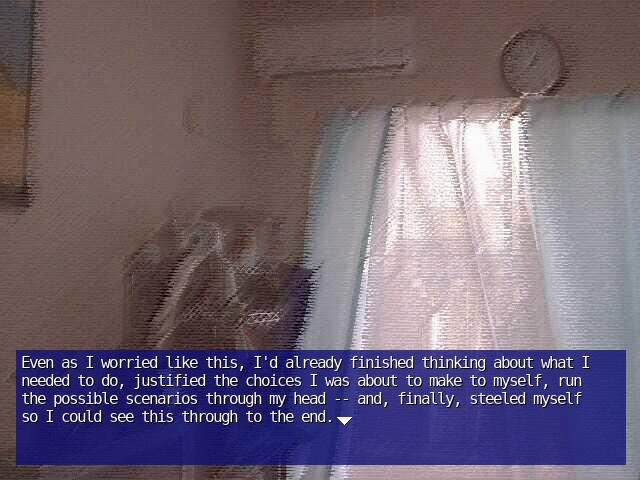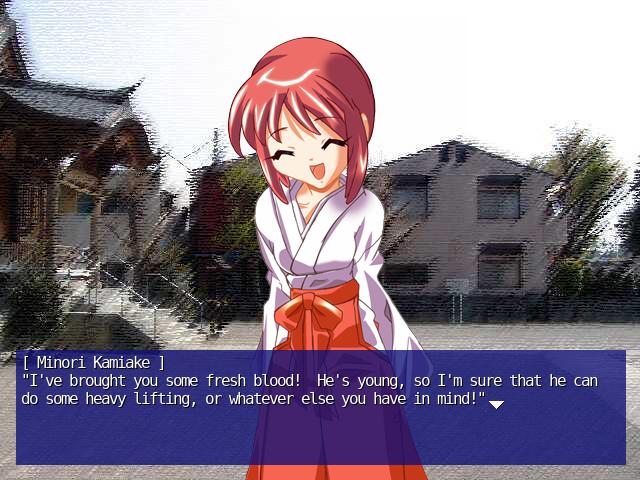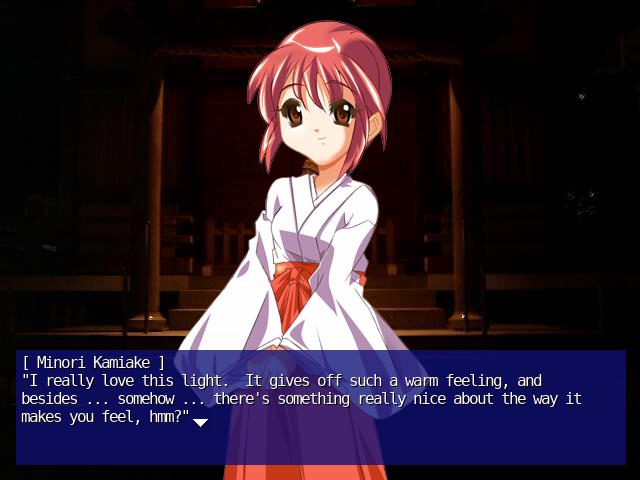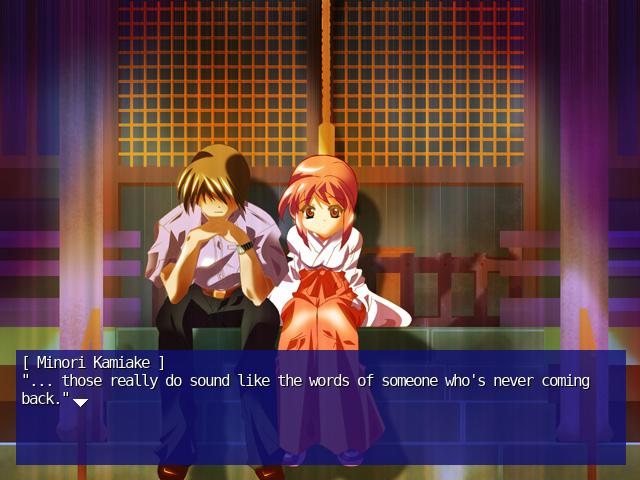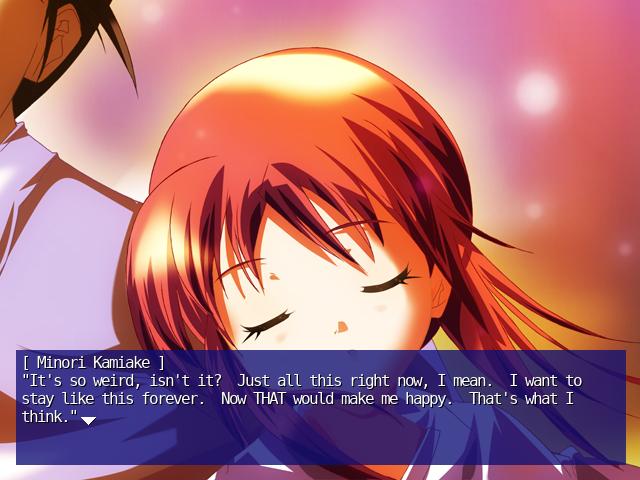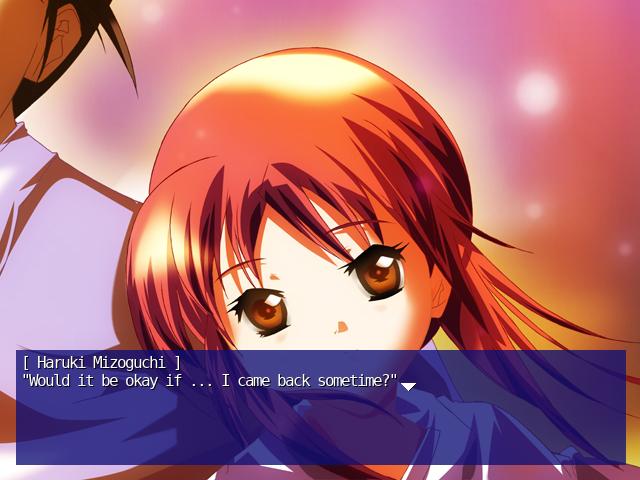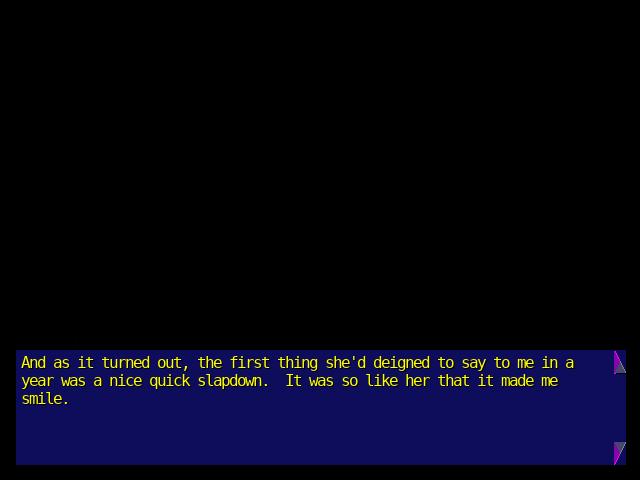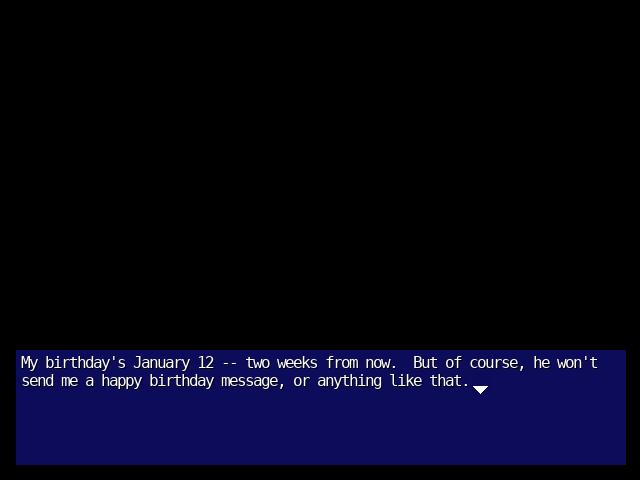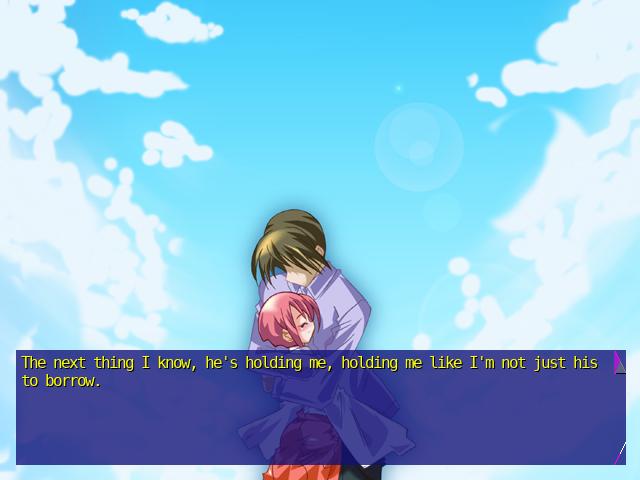This is part three of my four part series analyzing May Sky, the 2008 official English language localization of an impressive 2005 freeware Japanese visual novel called Gogatsu no Sora. This article covers the in-game period beginning May 24 and continuing on through the end of May of the following year. Everything in this article presupposes you have read parts 1 and 2 of my project and, ideally, my spoiler-free review of May Sky (I recommend starting with the review if you are not familiar with May Sky).
With that brief introduction out of the way, I pick up where I left off in part 2 of my 4-part analysis.
Note on Quotes
There are no itallics in May Sky. For ensuring clarity, I am using itallics in quoation blocks when the block includes a character’s internal monologue. I am doing this to distinguish the internal monologue quotes from spoken quotes.
May 24, 2005
On May 24, Haruki learned that he was going to be assigned to a new work site on June 1. That work site would be far away from his current location, meaning that he “would leave this place come June and would not come back very soon.”
May 29, 2005
The story then skipped ahead to May 29 – which would prove to be the most significant day of May in May Sky. We learn that Haruki had not yet told Minori that he would be leaving on May 31. After musing to himself that he would leave the town with his few possessions and there would be nothing of him left behind, Haruki resolved to take care of one bit of business he had in the town:
[T]here WAS something I was leaving behind. Just one. A single thing that would eat me up inside if I left without doing anything about it. Addressing the issue would hurt. Hurt like hell, probably. I knew that. But I also knew that if I didn’t do this right here and now, the hurt would never, ever go away.
Haruki Mizoguchi
Haruki had been procrastinating up until this point. But he was not doing nothing while procrastinating. Haruki drops some foreshadowing into his monologue:
Even as I worried like this, I’d already finished thinking about what I needed to do, justified the choices I was about to make to myself, run the possible scenarios through my head – and, finally, steeled myself so I could see this through the end.
Haruki Mizoguchi
The key in the above passage is “run the possible scenarios through my head.”
Haruki spent the better part of a week creating a mental script of his upcoming conversation with Minori. First he decided what he would say, then he tried to think of the possible ways that Minori could respond, and then he formulated his responses to how he believed Minori would respons. One could justifiably accuse Haruki of over-thinking things without knowing the specifics of his script. But as we will see, there is a more grounded danger in Haruki’s war-gaming: What if Minori responds in a way that he does not expect?
Before continuing, I will include one more quote from Haruki’s monologue:
Addressing the issue would hurt. Hurt like hell, probably. I knew that. But I also knew that if I didn’t do this right here and now, the hurt would never, ever go away.
Haruki Mizoguchi
Haruki’s monologue about “hurting” is missing a reference to something, or to be more precise, someone. As usual, Haruki seems to be thinking first and foremost about himself. He does not seem to contemplate the possibility of hurting Minori. I note this not to suggest that Haruki is malicious, but instead to invite readers to consider the possible implications of Haruki’s self-involvement on how he imagines his conversation with Minori transpiring.
Nevertheless, with his newfound resolve, Haruki made his way to Kamiake Shrine. Perhaps he expected. Haruki was surprised to find that the Shrine “was filled with tons of people,” mostly “forty something men.” Haruki found Minori in the crowd who revealed that there was a festival at the shrine that day. Minori was in high spirits:
She seemed like a little kid showing off her most prized possession…
Minori Kamiake
Minori was preparing to play a role in the festival in her capacity as a shrine maiden. This meant that Haruki’s talk with Minori would have to wait. In the interim, Minori volunteered an unwitting Haruki for manual labor – and he spent the day enraged in what he described in his narration as “my first and last act of service to this community…”
Haruki was initially annoyed, but he went along with it, never picking up on the fact that Minori most likely not only volunteered him to mess with him, but also because she wanted to share the festival experience she treasured with someone she had grown fond of. The older men who were also working at the festival liked Haruki, and he ended up in the festival procession next to Minori – where he took the opportunity to distract her while she was playing a fife in her ceremonial role.
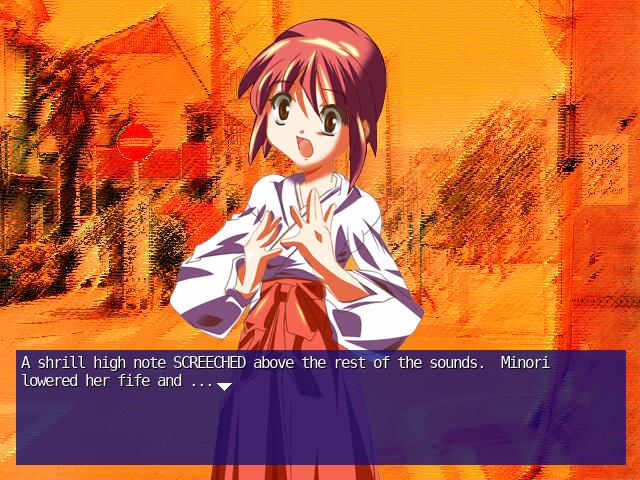
Haruki’s description of the festival is mostly beyond the scope of this analysis, but I will highlight one interesting point from his narration of participating in the festival procession:
I didn’t recognize most of the streets or places that we walked through. It brought home, more than ever, the sense that my time here had been so brief.
Haruki Mizoguchi
From reading the script as a whole, it also brought home that Haruki had not made any effort to see or fit into the town. When we met him at the beginning of May, he admitted that he had been unable to muster the energy to do anything more than going to and from work. While meeting Minori changed his life in the town – there is little indication that Haruki had taken the time to see what the town had to offer beyond Kamiake Shrine and its part-time shrine maiden. The weekend before Haruki’s departure from the town marked the first time that he took a small, too-late step, toward being a part of it. Minori rented him out to the town elders, and the town elders not only welcomed Haruki, but gave him a place in the parade procession before dragging him to an after party at the shrine. While he was sitting with them, Minori waved him over:
Mr. Mizoguchi, wanna come have dinner with me? Tonight my family is pretty much here at this festival, so …
Minori Kamiake
Minori stated that she wanted to get away because it was “Geezer Grand Central” and Haruki’s narration confirmed for us that “[n]obody was even close to Minori’s age group.” Haruki agreed and took Minori out to a restaurant.
Haruki had promised Minori 11 days earlier that he would treat her to tuna. It was at the restaurant where Haruki’s bill would (literally) come due – notwithstanding the fact that he had offered to treat Minori because he had somehow convinced himself that she was from a family of limited means.
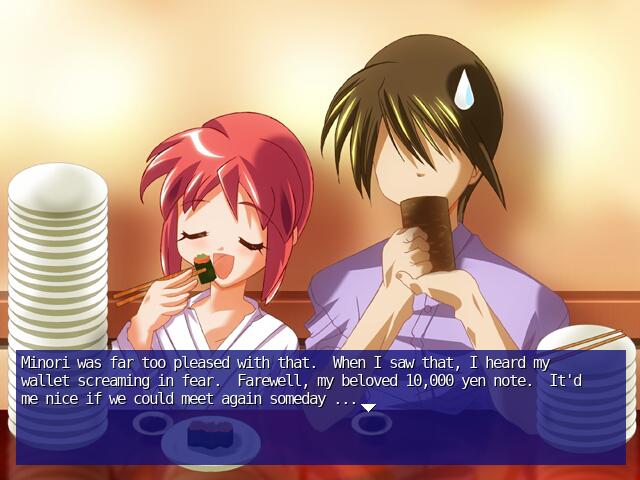
Haruki jokingly tried to get out of the arrangement as he gazed at Minori’s stack of 20 plates, but in the end he said farewell to his “beloved 10,000 yen note.” Haruki tried to enjoy his time with Minori, but he was tormented by the one thing he had yet to say but had to say:
At least as far as this restaurant went – God was in His heaven, all was right with the world. But it was the complete opposite within me. I was restless. Uneasy. With the weight of what I would have to say. With the burden of how I felt. With all that baggage.
Haruki Mizoguchi
(Note: The God was in his heaven line references a Minori quote from May 8, which coincidentally was the first time she lightened Haruki’s wallet.)
They left the restaurant at about 9 PM. Minori jokingly referenced the fact that she owed Haruki for treating her to food and drinks on four separate occasions (twice on May 8 and once on May 18). Haruki joked about having Minori repay him with barbecue, but this back-and-forth only reminded him of the fact that their back-and-forths would soon end. Before Haruki and Minori parted ways, he made a request of his acquaintance:
Would it be all right if … we went back to the shrine? I want to listen to you play the piano.
Haruki Mizoguchi
According to Haruki, “Minori looked completely mystified by my request, but she agreed to it without a second thought.”
Haruki and Minori found upon reaching the shrine that “all evidence of [the after party] was completely wiped away.” The shrine was pristine, having reverted back to that place apart that Haruki and Minori shared.
After some warm banter and one toe-stubbing incident, Minori sat down to play the piano. Below, I excerpt Haruki’s monologue:
When the piano music started, I thought I could see brilliant motes of light dancing around the notes that Minori was calling forward. … It was not until this moment that I’d realized this – but it was only ever since I’d come to this town … ever since I’d met Minori … that I’d taken to observing the sky like this. The waxing moon filled the cool evening air to the brim with gentle light; there was not a stir of wind or blast of rain; there was nothing in this world but the piano’s tones. Everything else had been washed away, and only the temple remained. The cosmos was in its whole a set of stone steps, on which there was only music and light.
Haruki Mizoguchi
When Minori rose from the piano and exited the lattice door separating the piano from the outside world, Haruki abruptly said what he needed to say:
I’m leaving this town tomorrow.
Haruki Mizoguchi
Haruki as narrator stated, “I’d been bracing myself for a trademark Minori response.” The phrasing here is interesting. By trademark Minori response, we can infer that Haruki expected Minori to respond flippantly – by indicating in some way or other that she did not care much whether Haruki stayed or left. From the use of bracing, we can infer that this would hurt Haruki because he had come to care for Minori despite being under the impression that she did not care about him. But most significantly for what will transpire – recall that he revealed in his internal monologue before setting out to meet Minori hours earlier that he had spent a few days imagining how his conversation with Minori would go and planning what he would say based on his predicting what Minori would say.
As Mike Tyson once said, “everybody has a plan until they get punched in the mouth.” Minori’s response upset Haruki’s plot (and upset Haruki):
… say … what? …
Minori Kamiake
Haruki noted that contrary to his expectations, Minori’s “face filled with sorrow.” Haruki admitted as narrator that he did not know how to feel about this unexpected (to him, at least) event.
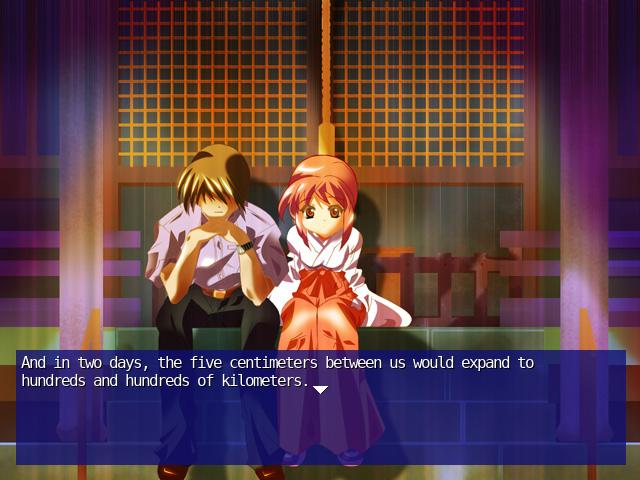
Haruki revealed to Minori in response to her questions that he was being sent far away and would be leaving the town the day after next. Minori was visibly not taking the news well, and Haruki described feeling like his “heart was being crushed.” Haruki had expected Minori to make it easier for him by expressing ambivalence leaving, but Minori was not playing the part he expected. This presented a problem. Haruki had constructed his mental script based on the premise that Minori would not care that he was leaving. Here, Haruki had the opportunity to quickly re-calibrate – to consider Minori’s obvious feelings and talk to the Minori in front of him instead of the Minori he imagined in his tiny apartment over the previous few days. Unfortunately, he decided to go full steam ahead with his script:
… I won’t be coming back here.
Haruki Mizoguchi
Recall in that when Haruki parted ways with his unnamed former colleague on May 14 (discussed in part 2 of the analysis), he stated that while he assumed that he would never see his former colleague again, it would be “too cold to tell him ‘farewell forever.'” Yet here he says just that to a young woman he clearly has much stronger feelings for. We can understand what Haruki is doing when we see that the audience for this declaration was himself, not Minori. He came up with the idea for the sake of giving himself closure. But in coming up with his plan to bravely declare that he would never return to the town, he assumed that Minori was not an interested party – that she would go about her life the same with or without his presence. By this point, however, it was clear that Minori was not taking the news well.
Minori tried unsuccessfully to keep a brave face:
I see … so we’ll never meet again, hmm?
Minori Kamiake
Haruki then, after confirming this was the case, told her that he had had fun and would never forget the time they spent together. Minori responded with “mhmm” to everything he said, and Haruki stated as narrator that “it felt as if I were destroying something precious, grinding every scrap into dust.” Minori picked up on the same thing:
… those really do sound like the words of someone who’s never coming back.
Minori Kamiake
Haruki responded that was because he never was coming back, and they both laughed uncomfortably.
However, something was about to change. Up until this point, Haruki had stuck to his script and, in so doing, trampled Minori’s feelings. But he would finally deviate from his script – at least in my reading – and put into words one last thing on his mind, his true feelings for Minori. Alas, we only have a reference to what happened next because as Haruki the narrator put it:
I don’t remember my own confession of love.
Haruki Mizoguchi
The Moon’s spotlight then focused on a stunned Minori:
Well now … this is the first time this has ever happened to me. I’m kind of drawing a blank here, and I have no idea what I’m supposed to say … You’re so unfair!
Minori Kamiake
Haruki’s confession was indeed unfair under the circumstances, and it had the effect of snapping Minori out of her disaffected melancholic state.
You don’t get to do this! Even though you’re never coming back, even though it’s not like you’re ever going to see me again, you just say what you feel like saying …
Minori Kamiake
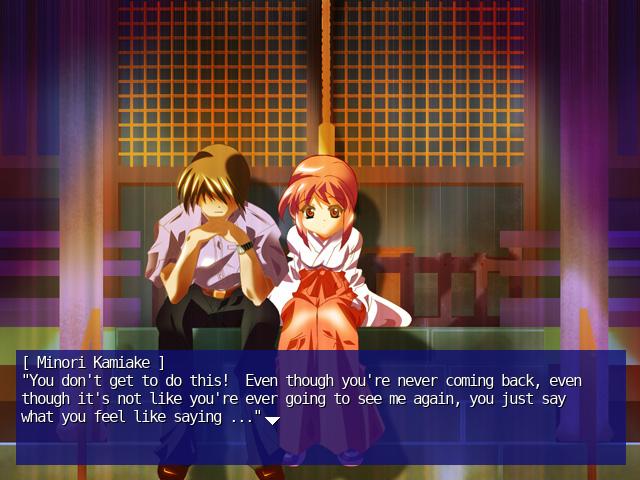
There is some subtle irony here. Minori’s complaints about Haruki’s behavior are entirely justified. But as is often the case – Minori can be correct about Haruki while reminding us of her own character flaws. It was Minori, after all, who on numerous occasions articulated her view that people should do whatever they want and whatever they do is correct since it must have been to them at the time. Here, Haruki had decided to cut ties with the town and Minori because he felt doing so would make it easier for him, but then, upon seeing that Minori seemingly cared for him more than he had thought, he decided to confess that he had fallen in love with her without otherwise changing his plan to leave her and the town for good. In both cases, Haruki impulsively did what he wanted to do without much regard for Minori’s feelings – just as Minori had said things on May 21 without considering how they would sound to Haruki. Haruki was wrong, but his actions were entirely consistent with how Minori opined people should behave.
That aside, Minori continued:
What am I supposed to do with MY feelings now? You’ve got the total advantage. You’re a coward and a cheat …
Minori Kamiake
Minori was simultaneously angry and confused, not having had time to process anything that Haruki was dumping on her. Haruki could only offer a meek apology, knowing full well that Minori was correct. Interestingly, narrator Haruki goes silent here – as if his future self has nothing to add beyond the present dialogue. Haruki replied to Minori with an honest statement of fact:
… I think it’s only because this is the last time, because we’ll never see each other again, that I was even able to get myself up to say this to you.
Haruki Mizoguchi
Minori took a moment and then addressed Haruki’s confession, again not quite how he expected:
… I don’t really know if I like you in that way. I mean, I never thought about you in that way either, so …
Minori Kamiake
I think Minori is being honest here. While I opined with regard to their May 21 meeting that Minori’s feelings were changing in ways that she did not fully understand, I do not think she had consciously thought of Haruki in romantic terms. Despite Haruki’s being unfair, his honesty triggered something in Minori. When he first announced that he was leaving, Minori tried unsuccessfully to keep a stoic facade and did not speak of what her face revealed of her feelings.
A careful reader can see that Minori did not reject Haruki’s confession, but was instead struggling to process what was happening. Haruki chimed in with his narration, stating that he understood what Minori said as “words of rejection,” but that he “felt becalmed” while he waited to hear what Minori would say next. Haruki continued to fixate on his own feelings instead of listening to Minori. But a reader can be optimistic that he also said he was ready to “wait[] forever if need be for her next words.” Perhaps Haruki would finally listen to the young lady he had fallen in love with.
After a pause, Minori decided to articulate one crucial part of her feelings:
But, still … without you, I’ll be alone. And that would kind of suck … Yeah, it’s true … it’s gonna be lonely …
Minori Kamiake
Minori then almost repeated herself before dismissing Haruki:
I feel alone … all alone .. but anyway, good luck with your new job.
Minori Kamiake
While Haruki still had not noticed that Minori did not reject his confession, he was finally compelled to plainly admit to himself in his narration that Minori actually did care about him and the time they spent together. He described feeling pained to see how upset Minori was but happy to learn that she cared enough for him to be upset.
The signs had been there throughout the novel that Minori was a lonely girl – but for the first time, she put those feelings into words. After that last line, Minori began to lose her composure and started apologizing – of course no apologies were needed. Here, narrator Haruki admits that he “had neither the time nor presence of mind to ponder what exactly she meant.” Minori then leaned against Haruki, joked that they must look like lovers, and stated she was happy in that moment while reiterating that she did not know if she liked him in that way. Then Minori finally stated what she wanted in terms that not even Haruki could misunderstand:
It’s so weird, isn’t it? Just all this right now, I mean. I want to stay like this forever. Now THAT would make me happy. That’s what I think.
Minori Kamiake
This turns out to be the decisive moment – but let us take a step back to understand why.
Haruki had incorrectly assumed that Minori would respond to his leaving wirth indifference. This was because Haruki had misunderstood Minori’s feelings based on their prior interactions, most significantly May 15 and 21. But there was one sense in which Minori did behave in what Haruki may have understood to be trademark Minori. While she was upset he was leaving, she did not allow herself to say that she wished he would stay. While she was even more upset when he said he would never return, she did not say that she wanted to see him again. His confession of love understandably confused Minori, and Haruki refused to allow himself to believe that she was open to his feelings, even after having to conclude that she greatly valued his presence in her life. Minori eventually gathered herself, and for the first time in the conversation put into words what she obviously wanted: “I want to stay like this forever.” In simpler terms, Minori was happy leaning against Haruki and wanted to continue spending time with him. Narrator Haruki said to himself that he “was thinking the same thing” as Minori.
The dye had been cast. Haruki has been consistent throughout the story in one respect: There’s a certain someone he cannot turn down. Minori asked again if she would never see Haruki again and he half-heartedly affirmed this. But Haruki’s narration foreshadowed the inevitable that he had not yet spoken:
And slowly, all this hard resignation I had inside of me was melting away. Things – my heart – the world – were changing in this wonderful time where there was just the two of us.
Haruki Mizoguchi
Out of the blue, Haruki asked a question which surprised Minori:
Would it be okay if … I came back sometime?
Haruki Mizoguchi
Minori reminded Haruki that he had just said he was never returning, but Haruki waved that objection away by stating that he had changed his mind. Minori was happy enough to not press the issue of Haruki’s whiplash-inducing behavior further:
So … if you’re gonna come back … when will that be?
Minori Kamiake
Haruki responded honestly that “[i]t could be a month … or could be a year,” noting in his narration that his job assignment was for one year and he had to remain on call even on his off days. Minori warned Haruki:
… I don’t think I can do it. If I wait that long, then all my feelings for you will turn to zero … and I’ll forget you … I don’t think I could keep the candles burning for you. Because I don’t like you all THAT much …
Minori Kamiake
Minori stated she would make no promises, and Haruki accepted her terms but promised to not forget her. Minori, then in a moment of genuine happiness despite having been jerked around quite a bit over the course of a few minutes:
… I’m happy. I must be the happiest girl in the world right now. Knowing that there exists a person who would choose me to think about, that’s got to be what happiness means …
Minori Kamiake
To be sure, we saw in their more friendly interactions that Minori liked attention and enjoyed Haruki’s attention. For the first time, she is connecting that impulse to romantic attention. Of course, Minori qualified all of this:
… right this second, I think I really, really want to see you again. I don’t know how I’m going to feel tomorrow, but that’s how I feel right now. Sorry, but out of all the girls you could have picked, you picked out a strange one.
Minori Kamiake
Haruki, to Minori’s happiness and amusement, stated that he “didn’t mind at all.”
Haruki concluded May 29 with his narration:
Knowing each other too well to be strangers, not knowing each other well enough to be friends – but still, having total faith in each other. Such a strange relationship.
Haruki Mizoguchi
May 31, 2005
Haruki stopped by the shrine on the morning of his departure on May 31. There, despite it being a school day, he found Minori in her full shrine maiden robes. Haruki asked Minori if she was waiting, and Minori stated she was without any sarcasm.
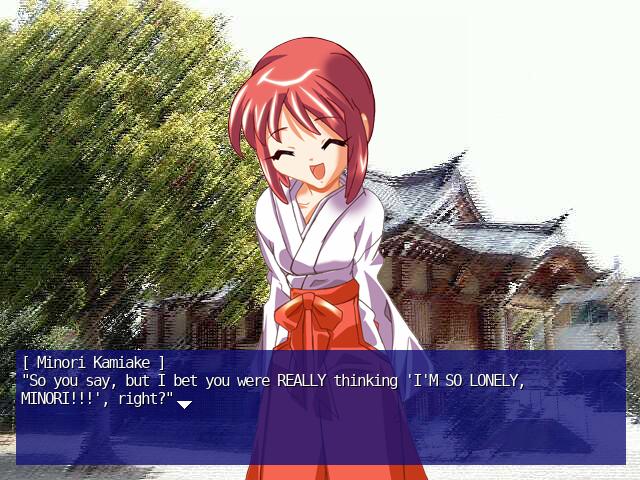
Haruki insisted he was there just to pray for his safe travel, and after teasing him, Minori taught him how to say a proper prayer. Before Minori left for school and Haruki left for his new home, Haruki finally got something that would come in handy: Minori’s phone number.
I preface my final bit of analysis of Haruki’s dumpster fire of a farewell-turned-confession by noting again that in discussing the flaws of Haruki and Minori, I am not fully equating them – for Minori’s short-comings are generally more forgivable than Haruki’s on account of her understandable age-related immaturity. The mess that was May 29 reminds us that the heart of May Sky is the strange relationship between two lonely, needy, and often-selfish people. Their friendship was driven to the brink not by Haruki’s having to move, but because of their own behavior. Minori took Haruki’s presence in her life for granted, confided in him while keeping him at a distance, and conveyed that she valued him because he meant nothing to her. For his part, Haruki let his own feelings for Minori get in the way of understanding Minori’s perspective on May 21 – which would have been intelligible to him had he been less emotional. Throughout his failed attempt to part ways with Minori, Haruki proved unable and unwilling to quickly adjust when Minori defied his expectations and took several actions, from attempting to sever ties to subsequently confessing his love, which were nothing if not self-centered.
Everything Haruki did on May 29 backed Minori into a corner. Minori was not only dealing with her being confessed to for the first time, but also with having to be open and honest about her feelings to avoid losing something that, in the face of loss, she realized was important to her. While Minori did not have time to process her possible romantic feelings for Haruki, his self-centered declaration that they would never see each other again and, by the way, “I love you,” forced Minori to honestly grapple with the fact that she had come to depend on Haruki for companionship over the course of four weeks, that she was much less lonely with him in her life than without, and that she would be happy if their time together continued. Minori thus stumbled into saving their friendship (and perhaps more), for I doubt she had fully understood the cosmic significance of simply being honest and unambiguously stating that she wanted to be with Haruki. Haruki’s whiplash reversal from “I will never see you again” to “I will never forget you and I will be back” makes perfect sense based on what we know about him. Once Minori made her wish clear, there was only one thing Haruki could do.
I avoided opining too much about Haruki’s romantic feelings until now as to not totally spoil the ending – especially since we may have some analysis readers who are following along in lieu of reading the novel. I am confident that Minori had not thought much about romance until Haruki’s confession. Haruki the narrator was notably silent about romantic feelings for Minori prior to recounting his confession, forcing us to rely on events to get to the bottom of the matter. There was no indication that Haruki considered Minori to be unusually attractive – he had as narrator described her behavior as cute and referenced enjoying the attention of a cute high school girl (I suspect he was not a Giga-Chad in high school), but nothing more. But Haruki had called Minori “beautiful” once – when he first saw her playing the piano in the glow of the afternoon sun on May 1. He in fact called everything in that scene beautiful, from Minori herself to her music. A few days later, Haruki admitted to seeing something “incredible” in Minori when she opened his eyes to the beauty of May. While Haruki seems and generally behaves like a simple man, all evidence suggests he fell in love with that something beautiful he saw in Minori – her aesthetic sensibility and way of seeing the world resonated with him and, by his own admission, changed the way he started looking at the world around him. With that being said, I think it took some time for those feelings to develop into something concrete enough for Haruki to act on. Haruki’s negative reactions to things Minori said on the 15th and 21st were likely influenced by the fact he had deeper feelings for her than the feelings one would have toward a fun acquaintance. It is entirely possible that narrator Haruki’s omission was very minor, and that he genuinely had not at any point seriously consider acknowledging much less confessing his love to Minori until he saw how she reacted to his leaving on May 29 (which, to be sure, would not undercut Minori’s assertion that he was a coward).
Their Year Apart
The novel changes gears completely in how it covers the events of the ensuing year. This section is split into two, with the first half being narrated by Haruki and the second half narrated by Minori. We will focus primarily on the Minori side here, both because Haruki’s is less eventful and also because it is the first and only time the novel takes us inside Minori’s thoughts and lets us see the world from her perspective.
The middle-year section of the novel begins from Haruki’s perspective. We find him at his new job three months later, on August 28, 2005, a Sunday. We learn that he had not yet had a chance to go anywhere outside of his new town, including to visit a certain shrine maiden. Haruki had taken advantage of having acquired Minori’s phone number, but:
Of all the text messages I’d sent off to that shrine maiden, not a one had been responded to. And every single time that happened, I always ended up going, ’oh I’ll give it another week, then I’ll send another. Not only was I not freaking out over this, but I was, in fact, looking forward to sending the next message off. Weird, wasn’t it?
Haruki Mizoguchi
Haruki explained his sentiments in this way:
For Minori Kamiake couldn’t help but be this way.
Haruki Mizoguchi
Haruki’s Minori-inspired sentimentality had not abated at his new job. He described having one plant in his small apartment, a Mayflower that he had picked up at the end of June for no reason other than its name.
Haruki sounds slightly more grown-up in this middle section than he did in that fateful May. His freshman blues have subsided and he seems to find work fulfilling. But there was one thing he hated:
The aching restless in my heart was growing worse and worse … So maybe this horrible feeling was what they call ‘love’.
Haruki’s section the skips ahead from to April 16 of the next year (again, almost certainly 2006). He had sent Minori a simple text, his 23rd according to him: “I’ll return in May.” The next day, Minori responded to Haruki’s message for the first time: “I’m not holding my breath.” Haruki described Minori’s first words to him in more than a year as “so like her that it made me smile.” He admitted in his narration that he cried a little bit that night. Haruki explained the circumstances that led to his impending return:
I had finished a long year’s work assignment. In recognition of my slavish work and achievements, they awarded me a reassignment to the firm’s headquarters, plus a week’s vacation … I didn’t manage the exact area that I’d lived in before, but I would be fairly close.
Haruki Mizoguchi
Haruki’s narration concludes with his return to that town on May 31, 2006. He took in the late May sky and remembered Minori’s argument that May was the best time of the year. He followed the sound of a certain piano toward a certain shrine that he found “hadn’t changed a bit over this past year” just as he had done the year prior. He then sat on the steps and waited for a certain lattice door to open.
Before we find out what happens next – the novel switches perspective to Minori after the end credits. On June 17 of 2005, Minori narrated her reaction upon reading Haruki’s third text message since Haruki had departed.
Characters appear on the screen. There’s so much kindness in them that it’s too much for me. I read it all without emotion. And then I flip my phone back down without even bothering to reply.
Minori Kamiake
Minori then noted that she had been talking to her friends about her peculiar circumstances and received feedback on her decision to not respond to Haruki’s messages:
My girlfriends tell me this is a stupid thing to do. I think so too. And I think I’m making a big mistake. But you know, that’s always been Minori Kamiake’s stance. That’s always been the coldest part of me, the one I only show to him, the one I never show to anyone else. And that’s why I’m prepared to keep holding this stance. Even if my heart tightens and shatters with pain. Just as it is now. I really have no idea what I’m reacting to, why I’m doing this. I don’t know much. But I do know this: it’s important for me to hold this stance – for me to be me. How long, then? How long will this temperance – which I selfishly explain away by going “oh, he’ll understand” – continue?
Minori Kamiake
This is an interesting look into Minori’s mind. At a basic level – I understand her position as being that she’s unwilling to overtly engage in some sort of long distance relationship with Haruki. Phone messages would not abate Minori’s loneliness or recapture what she felt in May 2005. Regarding her “stance” and “coldest part of me” lines, Minori’s behavior is consistent with the worldview she articulated to Haruki – that they should both do what they wanted. Haruki could keep sending her messages and Minori could keep holding out until he returned. But through it all, while Minori takes the view that she had no choice but to stay true to herself, she described her own actions as “stupid” and “selfish” and expressed the fear that perhaps there would come a point when Haruki would lose interest in her.
Before we turn the calendar, I will note one last interesting note from Minori about June 17:
It’s raining today. A May shower, just like that day…
Minori Kamiake
It had been raining on May 21, which was the day Minori inadvertently led Haruki to believe that he was nothing to her. It is curious that the author made a point of having her think of May 21 instead of the day of Haruki’s confession, May 29, but Minori does not have anything more to say on the matter.
We then skip ahead to December 27. Minori referenced Haruki’s 22nd message – an interesting specific since we know from Haruki’s side of the story that his April 16 message was the 23rd. Minori noted that Haruki expressed the desire to return but stated that he could not yet. She then narrated solemnly:
I spent Christmas alone.
Minori Kamiake
But while Minori was still not responding to Haruki’s messages, the messages had an effect on the lonely girl:
[O]n a good day, I catch myself wondering if it’s finally come time for them to become good memories. But then he sends me a message, and then my heart’s breaking all over again, and I’m dreadfully lonely. And when the messages stop coming all of a sudden, the pain I thought I left behind in my memories just comes roaring back. It may be getting a little weaker, sure. But it’s still there, tormenting me – unending.
Minori Kamiake
Minori referenced that her birthday was in two weeks, on January 12 – but that she did not expect to receive a birthday message. The reason was related to the peculiarity of their relationship-in-stasis:
[S]o I continue to wait for this man who doesn’t even know when my birthday is.
Minori Kamiake
Finally, Minori’s side of the story converges with Haruki’s on April 16. She described needing half a day to compose herself after Haruki wrote that he would return in May – specifically because it was the first of his messages where he said something definitive. She described her thought process in coming up with her “not holding my breath” response:
It has to be something that’s completely the opposite of what I actually feel. Something nice and indifferent and neutral. Something very ‘me’.
Minori Kamiake
But after sending her indifferent response:
[T]hen I run to my calendar immediately and draw a big circle around May.
Minori Kamiake
Minori’s narration then skips ahead to May 31. According to her, she played the piano at the shrine every day in May, hoping to be playing when Haruki returned. On May 31, she had understandably given up, and pledged to herself that:
After today, I won’t come to play the piano here ever again. I won’t be able to touch this thing again until time heals these wounds and I can look back on these events fondly. He told me he’d return. But he hasn’t. I won’t be able to keep him in my heart anymore.
Minori Kamiake
Minori’s despairing pessimism was justified. I dare say Haruki could have sent an update. But I suppose Haruki was going to be Haruki just as Minori was going to be Minori. Minori opened the lattice door after she finished playing the piano expecting to say so long to her feelings. Instead, she saw the man she had been waiting for. We are still viewing the story from Minori’s perspective, but the first spoken line comes from Haruki:
… sorry I’m so late, Minori.
Haruki Mizoguchi
Minori tried to stay in character, but admitted that she was trembling:
… y- … you’re … so late … I … I’ve c-c-c-completely f-f-forgotten you …
Minori Kamiake
After gathering herself, Minori ran up to Haruki and said what she had kept inside for a full year:
… I wanted to see you so much! I’ve been waiting, waiting this entire time …!
Minori Kamiake
Minori’s narration concluded as follows:
The arms that wrap around me are strong, yet gentle.
The warmth I’ve long been waiting for is right here.
The place I want as my own is right here at his side.
The man I always want to be with is right here.
The May sky spreads out high above us, in all its blueness and clarity.
The gentle sun showers its affection down on us from its high place in the heavenly spheres.
May is ending …
… and under the skies of June and every other month to come …
… we are beginning.
Minori had warned Haruki that her feelings might change if he took too long to return. He took a full year and Minori, by her own admission, had a difficult time. But her doubts melted away when she saw the man she had been waiting for. Our mercurial shrine maiden’s sadness instantly gave way to optimism about the days ahead .
Part 3 Final Analysis
Many visual novels, anime, and manga have a tendency to go all in on the build-up to a relationship and skip the actual relationship. May Sky could have easily ended things with Minori accepting Haruki’s confession. Instead, it opted to do two things – both of which undoubtedly made it a more difficult project than it had to be, and both of which were necessary for May Sky to ultimately be the terrific final product it is.
May Sky grappled with the necessary consequences of its own scenario in the section covering the events after May 31, 2005. Haruki and Minori had spent much of May 2005 together, but they still did not know each other particularly well. They both had their flaws and they were both in periods of transition, Haruki with his new job and Minori being 16 (17 by the end of the section covered). While the post-May section was brief, it conveyed that both Haruki and Minori grew up in some important ways. Haruki sounds more mature in his half of the post-May section, settling into his new job and carrying with him to his new town some of the sensibilities he had garnered from Minori . I have little doubt that having the goal of completing his work assignment and then returning to Minori was good for Haruki’s character. Minori opened up to her friends about Haruki. While she was conflicted about how to deal with them being apart, we see in her monologues that Minori began to think critically about why she did certain things and felt certain ways and how her actions could be interpreted by others.
Given Haruki’s and Minori’s flaws and the oddness of their relationship, one could debate whether a relationship was really going to work out, or even whether it should. Fortunately, May Sky has one more story up its sleeve – the August Snow chapter, wherein we receive a slice-of-life snippet of the new couple. I invite you to join me as we get a look at what happens after Haruki’s dramatic return to the Kamiake Shrine.
This article is part of my collection of posts about May Sky, Insani's 2008 localization of a freeware Japanese visual novel called Gogatsu no Sora.
